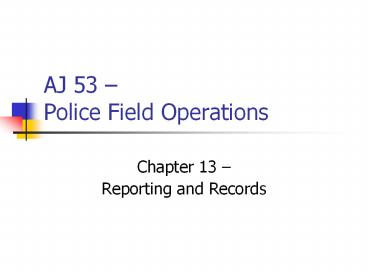AJ 53 – Police Field Operations - PowerPoint PPT Presentation
1 / 15
Title:
AJ 53 – Police Field Operations
Description:
AJ 53 Police Field Operations Chapter 13 Reporting and Records Importance of Report Writing To ensure Due Process, must have sufficient information & evidence ... – PowerPoint PPT presentation
Number of Views:49
Avg rating:3.0/5.0
Title: AJ 53 – Police Field Operations
1
AJ 53 Police Field Operations
- Chapter 13
- Reporting and Records
2
Importance of Report Writing
- To ensure Due Process, must have sufficient
information evidence to assist - Follow-Up Investigators
- Prosecutors, Defense Attorneys
- Judges, Jury Members
- Legal document which becomes a permanent record
of particular crime or incident - Impact of report writing?
- May take up 50 of actual patrol shift!
3
Uses of Reports
- Identify, apprehend, prosecute criminals
- Assist DAs, PDs, other agencies
- Assist officer before during testimony
- Help determine civil liability
- Compile criminal justice statistics
- Allocate resources
- Provide information for Media Public
- Serve as basis for officer performance evaluation
4
Field Notes
- Provide basic information for report
- Identifying information of all parties
- Summary of individuals statements
- Weather, lighting, etc.
- Must be clear and accurate!
- Must be able to read/understand what you wrote
- Names, addresses, times, etc.
- Serve as outline for final Report
- Face Page and Narrative
5
Field Note Considerations
- Best type of notebook to use?
- Advantages/Disadvantages to each size
- Consider having more than one available
- New/separate page for each incident
- Clearly indicate date/time/case no., etc.
- Tape record interviews when possible
- Aids with recall of exact statements made
- Include Facts only, no personal opinions
- Field notes are Discoverable!
6
Questions to Ask
- Who?
- What?
- When?
- Where?
- Why?
- How?
- Refer to list, page 436-437
7
Retain or Destroy?
- May be determined by Department Policy
- If you choose to retain
- How? Where? How long?
- Courts have upheld destruction, if
- Notes destroyed in good faith
- Content has been transferred to report
- Report accurately represents notes
- Defense has access to officers report
8
Note-Taking Techniques
- Interview people individually/separately
- Use quotation marks for exact quotes
- Paraphrase statements but do not compromise on
accuracy - Keep notes clear, simple, and legible!
- Establish a consistent style
9
Report-Writing Considerations
- Must describe something you may not have
witnessed personally - Relying on second/third-hand accounts
- Must clearly describe event to others who were
not present - Supervisors, Investigators, DA, Court, etc.
- Due Process requires report to be
- Clear, Factual, Accurate, Complete
10
Report Writing (continued)
- Review notes
- Clarity and accuracy of information
- Make an Outline
- Arrange notes in chronological order
- Identify key actions, statements, etc
- Mentally create a rough draft before writing
actual report - Proofread after writing report
- Print read, read aloud, another person
11
Narrative Content Format
- Introduction
- Day, date, time, location
- How officer became involved
- Body
- Victim/Witness statements
- Conclusion
- Officer actions
- Disposition of evidence, suspects, etc.
- Follow-up required
12
Report Content
- Free Flowing Narrative style
- As if telling a story to someone
- Use paragraphs for clarity understandability
- First-Person vs. Third-Person
- Officer I
- Names of Persons Involved
- Full names at first, last names thereafter
- May have to use first names for clarity
- Avoid ambiguous pronouns, words, phrases, etc.
(p. 454-455) - Facts vs. Opinions
- Report should be objectively factual/accurate
- Opinions may be based on factual information
13
Types of Reports
- Crime/Offense/Arrest Reports
- Document occurrences of specific crimes
- Corpus delicti, crime elements, MO
- Suspect information, weapons used
- Property, physical evidence, chain-of-custody
- Incident Reports
- Document non-criminal or civil incidents/events
- Specialized Report Forms
- Traffic Collision, DUI, 11550 HS, 10851 VC, etc.
14
Records Management
- Law Enforcement relies heavily on reports and
records keeping - Crime statistics
- Types of calls
- Response times
- Records Management System
- Storage of reported data that is somehow
retrievable - Must be reliable and accurate
15
Uses of LE Records
- Crimes Incidents
- Arrests
- Offender Registration
- Warrants
- Wanted Persons
- Missing Persons
- Lost/Stolen Property
- Vehicle Registration
- Stolen Vehicles
- Towed Vehicles
- Gun Registration































